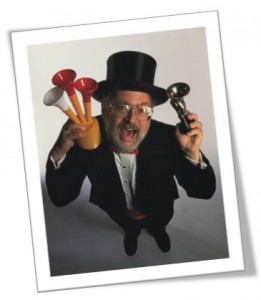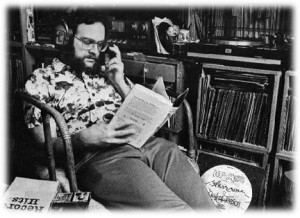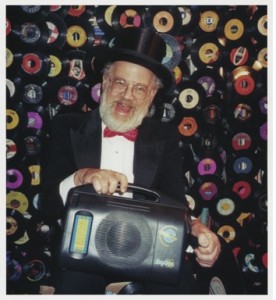With this edition of Radio’s Most Innovative falling on Halloween, it only seemed appropriate to look for an innovation that’s a bit out of the ordinary. So today we’re shining the light on Barry Hansen, a musicologist with a Master’s degree from UCLA, who wound up making an unusual and indelible mark on radio.
Maybe you don’t know Barry by his given name. But chances are, you’ve heard of Dr. Demento.
Barry made his mark in radio featuring “Fish Heads,” “Dead Puppies,” and “Flying Purple People Eaters” – the one-eyed, one-horned variety of course. His radio career spans more than four decades, during which he’s been known to most by his alter ego, Dr. Demento, host of a weekly expedition into “mad music and crazy comedy.”
 The Dr. Demento Show featured novelty songs from generations of artists and genres, ranging from the 1940s to present day, along with comedy clips from George Carlin and many other famous stand-up comics. Barry interviewed Frank Zappa multiple times, as well as Mel Brooks and all three members of Spinal Tap in costume and character. He has been inducted into both the Radio Hall of Fame and the Comedy Music Hall of Fame.
The Dr. Demento Show featured novelty songs from generations of artists and genres, ranging from the 1940s to present day, along with comedy clips from George Carlin and many other famous stand-up comics. Barry interviewed Frank Zappa multiple times, as well as Mel Brooks and all three members of Spinal Tap in costume and character. He has been inducted into both the Radio Hall of Fame and the Comedy Music Hall of Fame.
At its peak, The Dr. Demento Show was heard on 200 stations across the country. It was the launching pad for Alfred “Weird Al” Yankovic’s career, and influenced both Jimmy Fallon and Jack Black to pursue careers in comedy.
So, in honor of the day when things do tend to get a little bizarre, and some of us even dress up in costume, we asked Barry (aka Dr. Demento) to share his thoughts on developing such a unique brand, its lasting impact on radio, and what he sees as the future of comedy.
It is a story of persistence, risk-taking, music discovery, and the power of emerging platforms – in this case, FM radio.
JM: Tell us the story of how The Dr. Demento Show came to be.
DD: I was working for a small record company in 1969 when a friend introduced me to Steven Segal, aka The Obscene Steven Clean, who was on KMET. After visiting my place and sampling my music collection, Steven invited me to guest on his show. Eventually, after he moved to KPPC, my visits became a regular Thursday evening feature.
Steven started calling me Dr. Demento and it stuck. At first, he presented me as this crazy guy playing nuggets from my fabulous collection. However, “novelty” records like “Transfusion” and “The Purple People Eater” were part of the mix and when I’d take requests, people wanted to hear more of those records. The more I played, the more popular my feature got.
In March 1971, KPPC gave me my own two-hour time slot on Sunday evening. After moving to KMET, The Dr. Demento Show became the top-rated Sunday evening program in Los Angeles and syndicators came calling. A two-hour pre-recorded version of my show rolled out nationally in the spring of 1974. Westwood One picked it up in 1978 an d I remained with them until 1992.
d I remained with them until 1992.
JM: Launching a unique product like The Dr. Demento Show can be tough. How did you convince the people in charge to take a chance and put something so original on the radio?
DD: I was lucky enough to come along during a unique time in radio. During the late 1960s, the power of FM to attract a massive younger audience was just coming into focus and station owners weren’t always sure how to find those listeners. Steven Clean (who also helped convince management to hire me for my own shift), and PD Les Carter, gave me the chance to develop my own audience and let the show evolve. I played what that newfound audience liked which turned out to be funny music.
JM: What was one big hurdle you encountered and how did you overcome it?
DD: I can’t say there were any big hurdles. After I had been at KMET for a year or so, the ratings began to speak for themselves. When I began playing home-made tapes listeners had sent in, KMET was concerned because they weren’t officially released by a record label and cleared with ASCAP or BMI. So I proposed that I get each artist to sign a consent form. I still have some of those forms signed by Alfred Yankovic before he became known as Weird Al – the most popular of the many unknown artists I’ve been happy to play on the show.
JM: How do you explain the appeal of parody/novelty songs?
DD: From the mid-1950s to the mid-1960s, novelty 45s were frequently heard on Top 40 radio, and often placed high on the Billboard singles charts. In the late 1960s, as pop music became more ambitious and serious, novelty singles faded from the airwaves. I think I came along just as people then in their thirties were starting to miss hearing them. They were delighted to hear their old favorites and get to know many new ones. In the 1970s, as KMET was becoming more and more popular and the show went national, a new generation in their teens and early 20s discovered Dr. Demento and became my core audience.
JM: You were able to expand Dr. Demento into a brand with compilation albums, television appearances and other media. What is one suggestion you could share with someone trying to build a brand today?
DD: What I developed was highly unique. There was nothing like it in radio. After the show developed some momentum, I had managers, record labels and others to help expand the brand, but it started with and remained something unique. So the best suggestion I could make would be to come up with something as unique as my show. Not like my show, but something else unique. Of course that might not be as easy as it was in 1970!
JM: With YouTube, Facebook, and Twitter providing easy to use outlets for people to create and distribute comedy, what do you think of the material being created today?
DD: Some of the new things are really good. Jon Cozart, The Lonely Island, Epic Rap Battles of History, and the artists showcased on The Funny Music Project for example. For the most part the new funny music is more sophisticated than the novelty songs of the 1950s, generally appealing to a somewhat older audience than “The Purple People Eater” did when it was new.
JM: There is a movie called Under the Smogberry Trees: The True Story of Dr. Demento in the works. What will people discover about you in the movie they wouldn’t know otherwise?
DD: They’ll get to see Barry Hansen along with Dr. Demento. They’ll hear other kinds of music I like, experience my relatively low-key if somewhat eccentric offstage personality, and meet Sue (my wife of 31 years), my sister, and other close friends, too. But most of all I hope they see how much the show has inspired all kinds of people, famous and not so famous, to do their own thing, and how it’s opened a lot of people’s minds to music they hadn’t known existed. A whole lot of people have thanked me profusely for introducing them to the music of Frank Zappa.
JM: Can you elaborate on some of the people your show has inspired?
DD: Jimmy Fallon told Vanity Fair that as a boy he acquired a reel-to-reel tape machine specifically so he could tape the entire Dr. Demento Show without missing anything. When interviewed for Under the Smogberry Trees, Jimmy gave our show a whole lot of credit for inspiring his comedy endeavors, including his hosting of the Tonight Show. Jack Black, interviewed for Smogberry Trees, also gave our show credit for inspiring his career in comedy. TV executive Dan Pasternack (IFC, Big Beach TV) was a major fan of the show as a kid, and gives us full credit for his choice of a highly successful career.
 JM: In addition to hosting the show, you are also a noted musicologist. What do you think of online music sites like Pandora which use algorithms to curate music as opposed to the human touch?
JM: In addition to hosting the show, you are also a noted musicologist. What do you think of online music sites like Pandora which use algorithms to curate music as opposed to the human touch?
DD: I’ve never personally tried Pandora. I’m fortunate enough to have more music at my beck and call than most folks, having actively collected music for decades, and I don’t mind picking my own tunes to play for pleasure when I’m not busy checking out submissions for the show, and listeners’ suggestions. I don’t have anything against algorithms per se. I imagine their quality depends on the intelligence and taste of the humans who design them.
JM: Which song is your all-time favorite and why? And which one is the most cringe-worthy – even to you?
I deal in novelty music, and the essence of novelty is newness, so my favorite will usually be something new I just discovered that I think my audience will like. The audience’s all-time favorites are “Fish Heads,” “Dead Puppies,” “They’re Coming To Take Me Away, Ha-Haaa!” and the collected works of Weird Al, and though I might not put “Fish Heads” on my stereo every single day, those are all things I still enjoy hearing.
As for “cringe-worthy” – lots of people will use that word for music that’s sloppy or out of tune, or lyrics that are pompous or turgid or awkwardly phrased, but to me the only really bad music is boring music. And unfortunately, there’s a whole lot of that around. I do my best to provide a stimulating alternative.
Thanks to Mike Stern for interviewing Barry/Demento and writing today’s post. And to Dave Beasing for his help and inspiration.
INNOVATION QUOTE OF THE WEEK
“Without deviation from the norm, progress is not possible.”
Frank Zappa
More of Radio’s Most Innovative
- Radio’s Most Innovative: Nikki Marra’s “College Radio Road Trip”
- Radio’s Most Innovative: George Gimarc
- Radio’s Most Innovative: Scott Segelbaum’s “Rock Art Show”
- Radio’s Most Innovative: Film House
- Radio's Most Innovative: WTOP Digital
- Media And Technology In 2025: Believe It Or Not! - April 18, 2025
- In Radio, You Just Never Know - April 17, 2025
- The Secret To Making A Great Podcast (And Great Radio) - April 16, 2025





Once again, your “Most Innovative” honor goes to a very deserving individual.
I doubt there is anyone in our business who has been around long enough who has not heard of the good Doctor and his demented music library and sense of humor. His self-description of “highly unique” is perfect … and so were Sunday nights on KMET for many, many years.
It is a shame that there no longer seems to be room in the ether for him anymore. Wouldn’t you think that, with stations trying to fight off non-broadcast competition, a Dr. Demento revival would get some attention and some listenership return to terrestrial radio?
K.M., thanks for the comment. As Barry explained, he was fortunate to break onto the FM radio dial during that formative time when many broadcasters were much more focused on their AM stations. It’s a reminder that streams, HD2s, and other outlets should be more focused on innovators like Dr. Demento.
But you also make a great point that a syndicated rebirth (or resurrection) for the show just might be interesting. Based on Weird Al’s recent success, you get the feeling that goofball novelty songs are truly timeless. And as Barry also noted, there is new material being recorded all the time.
Thanks for taking the time.